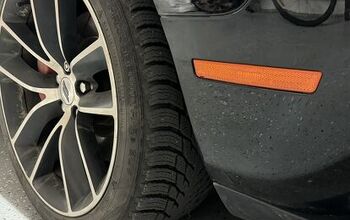Hammer Time: Abandoned Hope
It was Tamara’s first new car. A 2003 Saturn VUE AWD with a 4-cylinder and all the options. Out the door at $25,000. Overjoyed to have finally afforded her very own new car, Tamara splurged and spoiled it. Saturn seat covers soon adorned the interior and a chrome grille guard was added to give her cute zonker yellow ride a bit more gravitas. The Vue would be her absolute pride and joy for the next seven years.
Until it died. Seven years, two transmissions and only 69k miles, Tamara got fed up with being one of many victims of an under-engineered CVT. Besides she couldn’t afford the $5000+ bill.
Yet she wasn’t alone. Far from it. Tamara is just one of thousands of folks who have been given the stiff arm by a manufacturer. All the major manufacturers do this to a degree and no, it’s not because they are evil and uncaring. You have to draw a line somewhere.
GM offered purchasers of their new VUE’s with the defective CVT’s a $5000 rebate towards a new vehicle… or 50% of the cost of a new tranny. It was good for 5 years or 75,000 miles, and there were many occasions where GM would go beyond that warranty.
Was that enough? Most owners would say no. Even in the dog days of the 1970’s a vehicle was expected to last longer than that. GM’s profit margins on these vehicles would likely tell a different story. On a purely personal note, it seems ridiculous that any well kept transmission shouldn’t last at least 10 years and 150k miles these days.
But there are a lot of exceptions to this rule.
Honda extended their CVT warranty to 8 years and 80,000 miles on the 1st generation Honda Civic hybrid which weighs about 2700 pounds. However the 1st generation Insight (2000 – 2004 models) with the exact same C VTtransmission and 900 fewer pounds gets a 10 year / 157,000 mile warranty.
Guess which one has the stronger enthusiast community?
Nissan extended their CVT warranty to 10 years and 120,000 miles on seven different models built between 2003 and 2010. Yet Chrysler who uses the same sourced transmission has not offered any warranty extension.
Volvo provided a 10 year / 200,000 mile warranty on thousands of defective Electronic Throttle Modules that were built between1999 through 2002. However Volvo also saw fit to not offer an extended warranty on their Aisin-Warner and GM 5-speed automatic transmissions that had high failure rates on their Volvo V70’s, XC70’s, and XC90’s. Those only get 5 years and 60,000 miles.
Toyota experienced engine sludge issues on ten models built between 1997 and 2002. After a long legal fight they settled on offering full compensation for new owners who had the issues occur within 8 years and unlimited miles.
Ford developed a V platform for their Ford Windstar, Ford Freestar and Mercury Monterey that used a highly unreliable 4F50N transmission. No warranty extension on them from the 3 year / 36,000 mile warranty. But Ford has recalled the Windstar for safety related rust issues as has Toyota.
In short every manufacturer has issues and deals with them in ways that reflect their core beliefs. When it comes to safety nearly everyone covers the well-being of the customer. Powertrain and electronics issues? It depends.
Whenever I see someone shift from reverse to drive on an automatic without breaking, I wince. I’m sure I’m not the only one who feels that way. As a dealer few things tick me off more than experiencing some loudmouth schmuck who ragged out a creme puff and then demands money for their abuse and neglect.
There are a lot more folks out there who fit that description than today’s media will ever admit to.
In the coming years you’re going to see an amazing array of new electronics systems and advanced powertrains. Cars should be more reliable than ever… but they also will likely become more expensive to repair as well. The line of expectations between what ‘should’ last and what ‘does’ last will continue to blur for customers and manufacturers.
So who should hold the mantle of responsibility? Is it sane for a manufacturer to offer only 36,000 miles of warranty coverage in an industry where cars are routinely expected to last 5 to 7 times longer? Should the free market rule? Or should the government intercede in cases when defect levels go beyond the pale?
It’s very hard to draw that line. Just ask Tamara.
More by Steven Lang
Latest Car Reviews
Read moreLatest Product Reviews
Read moreRecent Comments
- Plaincraig 1975 Mercury Cougar with the 460 four barrel. My dad bought it new and removed all the pollution control stuff and did a lot of upgrades to the engine (450hp). I got to use it from 1986 to 1991 when I got my Eclipse GSX. The payments and insurance for a 3000GT were going to be too much. No tickets no accidents so far in my many years and miles.My sister learned on a 76 LTD with the 350 two barrel then a Ford Escort but she has tickets (speeding but she has contacts so they get dismissed or fine and no points) and accidents (none her fault)
- Namesakeone If I were the parent of a teenage daughter, I would want her in an H1 Hummer. It would be big enough to protect her in a crash, too big for her to afford the fuel (and thus keep her home), big enough to intimidate her in a parallel-parking situation (and thus keep her home), and the transmission tunnel would prevent backseat sex.If I were the parent of a teenage son, I would want him to have, for his first wheeled transportation...a ride-on lawnmower. For obvious reasons.
- ToolGuy If I were a teen under the tutelage of one of the B&B, I think it would make perfect sense to jump straight into one of those "forever cars"... see then I could drive it forever and not have to worry about ever replacing it. This plan seems flawless, doesn't it?
- Rover Sig A short cab pickup truck, F150 or C/K-1500 or Ram, preferably a 6 cyl. These have no room for more than one or two passengers (USAA stats show biggest factor in teenage accidents is a vehicle full of kids) and no back seat (common sense tells you what back seats are used for). In a full-size pickup truck, the inevitable teenage accident is more survivable. Second choice would be an old full-size car, but these have all but disappeared from the used car lots. The "cute small car" is a death trap.
- W Conrad Sure every technology has some environmental impact, but those stuck in fossil fuel land are just not seeing the future of EV's makes sense. Rather than making EV's even better, these automakers are sticking with what they know. It will mean their end.


































Comments
Join the conversation
@Steve Lang - "Honda extended their CVT warranty to 8 years and 80,000 miles on the 1st generation Honda Civic hybrid which weighs about 2700 pounds. However the 1st generation Insight (2000 – 2004 models) with the exact same C VTtransmission and 900 fewer pounds gets a 10 year / 157,000 mile warranty." I'm fairly sure that this is wrong. The 10 year Insight warranty applies only to the IMA battery and does not apply to the CVT (or any other part of the car). I don't think you can call out Honda on this one. The Gen 1 Insight does have an active enthusiast community, but that does not necessarily lead to special warranties. In any event, I don't believe that Insight CVT's are a problem - probably due to the particularly light weight of the Insight.
The belts in CVT's scare me. I've seen too many snowmobiles toss them to trust them in a car. Warranty varies quite a bit. BMW covered some electronic problems when I was out of warranty, and replaced all my coils twice, the second time "just in case" when that batch was recalled. I had no problems. Acura, on the other hand, is not nice. I had bad coils, in three dealer trips, they replaced one, then two. Car still didn't idle or run right, but they said "if it does not toss a check engine light it is OK". I ended up buying and replacing all six at my own expense, and the truck runs like a sewing machine again. I was 5k out of warranty and they refused to touch it, and even in warranty refused to replace all six coils. I then get a horrible racket from a rusted muffler heat shield and they want $600 to fix it. The car is again 5k out of warranty and has been babied. Oh, and they claimed they replaced my spark plugs (and charged Acura) but didn't. It is clear who would be more in the running for my replacement vehicles. A CVT....great idea, not in my driveway.